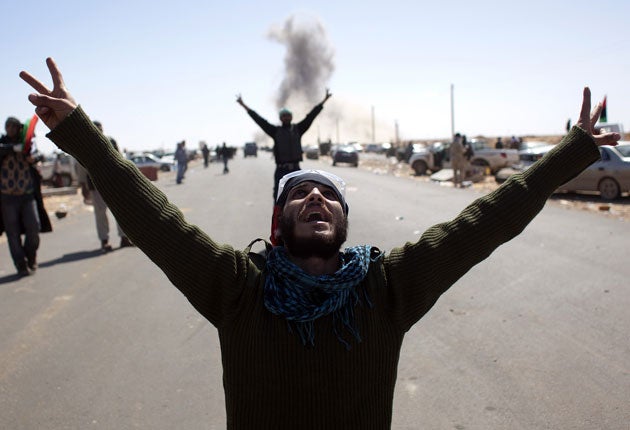The dead lay all around. The living fled in fear
Amid bloody scenes between the rebels and Gaddafi's forces, a new exodus begins. Kim Sengupta reports from Bin Jawad

Dead bodies, some lying on the streets among bullet casings; others left in their burnt, shattered homes – these were the dreadful scenes at Bin Jawad yesterday, after two days of fierce fighting.
The rebels claim the dead, including children, the elderly and women, were victims of Colonel Gaddafi's forces. Officials of the regime maintain, instead, that the fatalities had taken place when the town was attacked by militant fighters.
Whoever was responsible, the losses had fuelled the sense of panic and fear among the civilians caught up in the conflict.
For the first time since the revolution began, those fleeing are not just foreign workers, but Libyans who are refugees in their own homeland.
As well as the desire to escape the violence of the war, people are motivated to leave their homes by an increasing divide between the east of the country – largely out of the grasp of the regime – and the west, where it still largely retains control.
Suspicions about spies and collaborators had led to greater scrutiny and obstruction of movement from both sides in what is now a civil war and many have decided to seek security with their extended families and clans before the situation gets even worse.
The vast majority of the 200,000 refugees in Libya have been foreigners escaping through the Tunisian and Egyptian borders. But Hamida Muftar, a social worker working in the city of Al Bayda, said internal refugees would become an increasing issue: "We are lucky in having a social structure where the families look after each other. But that will not be enough, at the moment we have thousands of IDPs (internally displaced persons), this could turn to tens of thousands very soon if the fighting continues."
The latest are coming from Bin Jawad – a Libyan army garrison town now under regime control after violent clashes – and neighbouring Ras Lanuf, where the rebels have retreated. Having seen the devastation at Bin Jawad, Khalid Suleyman says he can understand why so many want to go.
The 22-year-old student from Benghazi, who had joined the revolutionary forces, the Shabaab, said: "It was the worst; the worst thing I have seen. I was sick.
"There were people who had died in a terrible way. There was one house where two women have been killed.
"Those who escaped getting hurt were running away; some were taking away the injured.
"A lot of people died when the government used heavy weapons against us like Jarad (Russian rockets) that cut some people in half.
"Why did they use such things where there were lots of people?"
The Shabaab refuse to accept that they were responsible for any civilian deaths. Colonel Abdul Jawad Al-Misawi, in charge of the anti-aircraft defences, was adamant. "The Gaddafi men used them as human shields. That is why we had to stop our mission to recapture the town.
"We did not want to harm them. Afterwards the Gaddafi men murdered these poor people."
In reality, the rebels were forced back from Bin Jawad after an ambush in which they lost up to 50 of their men and their subsequent attempts to go back were halted by artillery fire and air strikes.
Yesterday the road from Bin Jawad to Ras Lanuf was largely empty of the hurtling military convoys of the past few days. Regime troops were advancing, at a slow pace, towards Ras Lanuf.
Mohammed Ali Musa, a 33-year-old carpenter, was leaving with his wife Minar and three young sons. Like many others in the area he was keeping his options open on which side would emerge victorious when it came to apportioning blame.
"There was a lot trouble and people died. My neighbour Yaqub Hussseini died. He had a family. He was looking after his old parents, Allah rest his soul. I cannot say for certain who killed him. Maybe it was a bullet which struck him by accident."
As reports grew of regime forces getting close, Abdulmutallab al-Jadri and his family was among many leaving Ras Lanuf.
He said: "What reason do I have for staying? I have no job and if the fighting comes back here it will be very bad."
Join our commenting forum
Join thought-provoking conversations, follow other Independent readers and see their replies
Comments
Bookmark popover
Removed from bookmarks